One of the most impactful advancements in recent years is the rise of virtual tours.
Virtual tours have revolutionized the way potential buyers experience properties, offering immersive and interactive experiences from the comfort of their own homes. In this blog post, we will explore how virtual tours have become a game-changer in real estate marketing, enabling sellers to showcase properties effectively and buyers to make more informed decisions.
.
.
Enhancing the Buying Experience
Virtual tours provide a unique opportunity for prospective buyers to explore properties remotely. Gone are the days of relying solely on static images and descriptions. With virtual tours, buyers can virtually walk through homes, examining every corner and getting a true sense of the property’s layout, design, and ambiance. This immersive experience allows buyers to visualize themselves living in the space, which can significantly impact their emotional connection to the property.
Convenience and Accessibility
One of the key advantages of virtual tours is their convenience and accessibility. Buyers no longer need to physically visit multiple properties to get a sense of what they offer. With virtual tours, they can explore numerous homes from any location, saving time, effort, and resources. This accessibility is particularly beneficial for out-of-town buyers or those with limited mobility, enabling them to participate in the home-buying process more actively
.
.
.
Increased Engagement and Interest
Virtual tours offer an engaging and interactive experience that captures the attention of potential buyers. The ability to navigate through a property, zoom in on details, and explore different rooms creates a sense of ownership and involvement. Virtual tours are known to generate higher levels of engagement compared to traditional marketing methods. The longer visitors spend interacting with a virtual tour, the more likely they are to develop an emotional connection with the property, increasing the likelihood of a sale.
Overcoming Distance and International Markets
Real estate markets are no longer confined to local boundaries. Virtual tours have facilitated the expansion of real estate sales across regions and international borders. Buyers can now explore properties in different cities or even countries without leaving their homes. This has opened up new opportunities for real estate agents and sellers to target a broader audience and attract potential buyers who would otherwise have been deterred by distance or logistical challenges.
Cost-Effective Marketing Solution
Compared to traditional methods such as staging homes or organizing open houses, virtual tours offer a cost-effective marketing solution. By investing in virtual tour technology, real estate agents can showcase properties 24/7, reducing the need for physical showings and minimizing associated expenses. Virtual tours also enable sellers to reach a wider audience, increasing the chances of finding the right buyer in a shorter timeframe.
Transparency and Trust Building
Real estate transactions often involve a significant amount of trust between buyers and sellers. Virtual tours contribute to this trust-building process by providing a transparent view of the property. Buyers can explore every aspect of the home, scrutinizing the layout, finishes, and overall condition. This transparency helps establish credibility and fosters a sense of confidence in potential buyers, making them more comfortable with their purchasing decisions.
Conclusion
Virtual tours have emerged as a game-changer in real estate marketing, revolutionizing the way properties are showcased and bought. With their ability to enhance the buying experience, provide convenience and accessibility, increase engagement, overcome distance barriers, offer cost-effective marketing solutions, and foster transparency and trust, virtual tours have become an indispensable tool for real estate agents and sellers. As technology continues to advance, virtual tours will likely become an even more integral part of the real estate industry, reshaping the way we buy and sell properties in the future.



